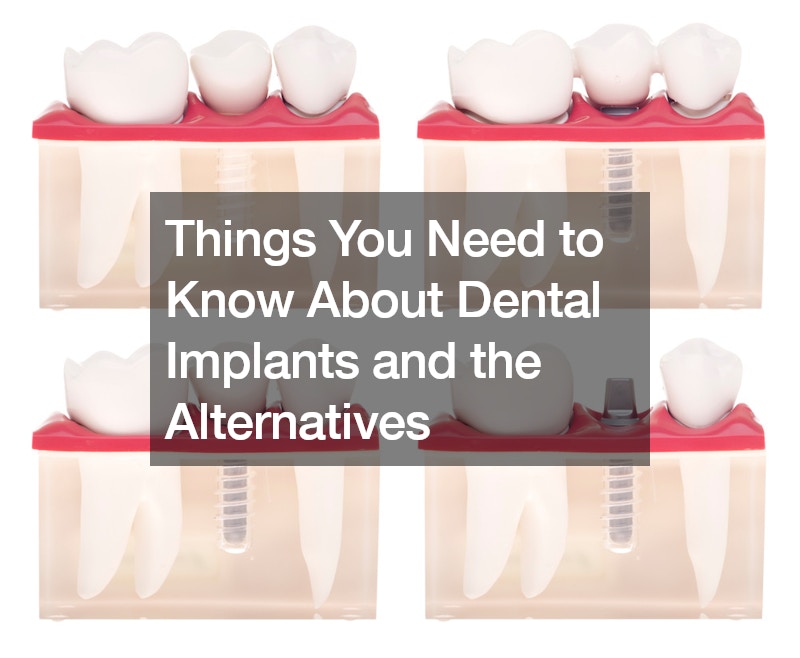Dental health is integral to overall well-being, and missing teeth can significantly impact both your appearance and functionality. Dental implants have emerged as a popular and effective solution for replacing missing teeth, but they are not the only option available. Understanding dental implants and the alternatives can help you make an informed decision about the best treatment for your needs.
What Are Dental Implants?
Dental implants are artificial tooth roots that aim to serve as a foundation for replacement teeth. Dental implant services involve a multi-step process, including consultation, surgical placement, healing period, and final restoration.
The Dental Implant Process
Consultation and Evaluation: A thorough dental examination, including X-rays and 3D imaging, to assess the condition of your jawbone and overall oral health.
Surgical Placement: The dentist uses local anesthesia when inserting the implant into the jawbone. Over time, the bone integrates with the implant in a process called osseointegration.
Healing Period: It typically takes several months for the implant to fully integrate with the bone. During this period, a temporary restoration may be placed.
Final Restoration: Once the implant has fused with the bone, the dentist will attach a custom-made crown, bridge, or denture to the implant.
Benefits of Dental Implants
Durability and Longevity: With proper care, dental implants can last a lifetime.
Functionality: Implants mimic the function of natural teeth, allowing for normal eating and speaking.
Aesthetic Appeal: Dental implants look and feel like natural teeth, enhancing your smile and overall appearance.
Bone Health: Implants stimulate the jawbone, preventing bone loss that often accompanies missing teeth.
Alternatives to Dental Implants
While dental implants offer numerous benefits, they are not suitable for everyone. Several alternatives can also effectively address tooth loss:
Dental Bridges
Dental bridges are fixed prosthetic devices that “bridge” the gap created by one or more missing teeth. They consist of one or more artificial teeth that mimic the apearance of natural teeth.
Pros:
Cost-Effective: Generally less expensive than implants.
Non-Surgical: Placement is less invasive and doesn’t require surgery.
Cons:
Durability: Bridges typically need replacement every 10-15 years.
Impact on Adjacent Teeth: Healthy teeth adjacent to the gap must be filed down to support the bridge.
Dentures
Dentures are removable devices that come in two main types: complete dentures for replacing all teeth and partial dentures for replacing a few missing teeth.
Pros:
Affordability: Dentures are usually the most cost-effective option.
Non-Invasive: No surgery is required for fitting dentures.
Cons:
Stability and Comfort: Dentures can shift and cause discomfort, especially lower dentures.
Bone Loss: They do not prevent jawbone deterioration.
Dental Crowns
A dental crown is a cap placed over a damaged tooth. While crowns are not a direct replacement for missing teeth, they are often used in conjunction with dental bridges or implants.
Pros:
Protection: Crowns protect weak or damaged teeth from further deterioration.
Aesthetic Improvement: They can significantly enhance the appearance of your teeth.
Cons:
Longevity: Crowns may need replacement after 10-15 years.
Tooth Preparation: Requires removal of some tooth structure.
Factors to Consider When Choosing a Tooth Replacement Option
Selecting the best tooth replacement option involves several considerations:
Oral Health
Your overall oral health, including the condition of your gums and jawbone, will significantly impact the suitability of dental implants. A strong, healthy jawbone is essential for implant success.
Cost
Dental implants tend to be more expensive than other options due to the surgical procedures involved. However, their longevity can make them a cost-effective solution in the long run.
Aesthetics
If aesthetics are a priority, dental implants and bridges offer a more natural look compared to dentures. Crowns can also provide significant aesthetic benefits.
Functionality
Consider how each option will affect your ability to eat, speak, and maintain oral hygiene. Implants generally offer the best functionality, closely mimicking natural teeth.
Maintenance
Implants require regular brushing and flossing, similar to natural teeth, while dentures need daily removal and cleaning. Bridges require careful cleaning around the supporting teeth.
Consultation with Dental Professionals
Consulting with a dental professional is crucial to determine the most suitable option for your specific needs. A dentist can provide personalized recommendations based on your oral health, budget, and lifestyle.
Importance of a Dental Implant Services Provider
If considering dental implants, choosing a reputable dental implant services provider is essential. Look for providers with:
Experience and Credentials: Ensure the provider has extensive experience and the necessary credentials in implant dentistry.
Advanced Technology: Providers who use advanced imaging and surgical technology can offer more precise and successful outcomes.
Patient Reviews: Check patient reviews and testimonials to gauge the provider’s reputation and patient satisfaction.
Conclusion
Tooth loss can significantly impact your quality of life, but various effective solutions are available to address this issue. Dental implants offer a durable, natural-looking, and functional solution, but they may not be suitable for everyone. Alternatives like dental bridges, dentures, and crowns provide viable options depending on your specific needs and circumstances. By consulting with dental professionals and considering factors such as oral health, cost, aesthetics, and functionality, you can make an informed decision that best suits your needs. Engaging a reputable dental implant services provider ensures you receive the highest quality care and achieve the best possible outcomes for your oral health and overall well-being.
.


